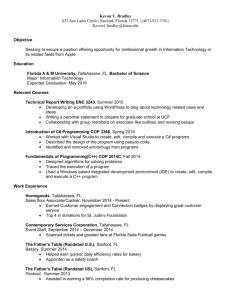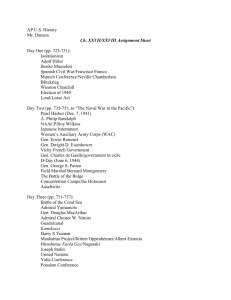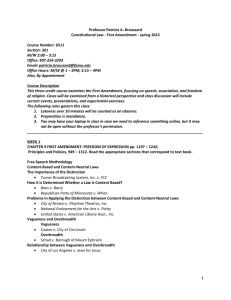GENERAL EDUCATION ASSESSMENT COMMITTEE
advertisement
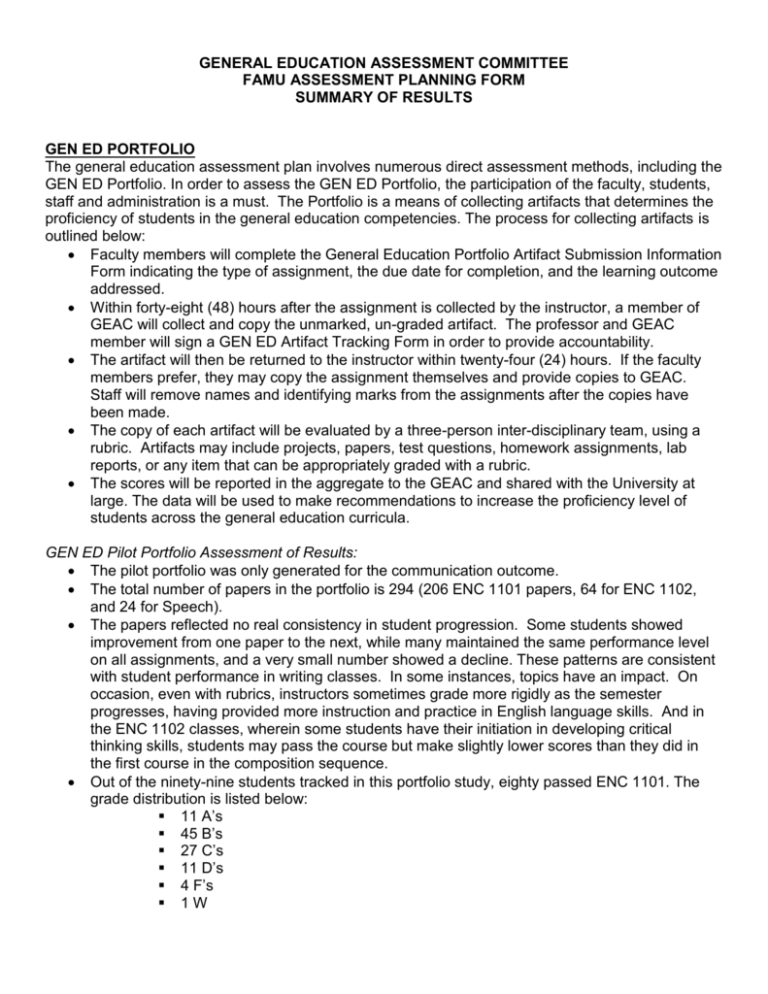
GENERAL EDUCATION ASSESSMENT COMMITTEE FAMU ASSESSMENT PLANNING FORM SUMMARY OF RESULTS GEN ED PORTFOLIO The general education assessment plan involves numerous direct assessment methods, including the GEN ED Portfolio. In order to assess the GEN ED Portfolio, the participation of the faculty, students, staff and administration is a must. The Portfolio is a means of collecting artifacts that determines the proficiency of students in the general education competencies. The process for collecting artifacts is outlined below: Faculty members will complete the General Education Portfolio Artifact Submission Information Form indicating the type of assignment, the due date for completion, and the learning outcome addressed. Within forty-eight (48) hours after the assignment is collected by the instructor, a member of GEAC will collect and copy the unmarked, un-graded artifact. The professor and GEAC member will sign a GEN ED Artifact Tracking Form in order to provide accountability. The artifact will then be returned to the instructor within twenty-four (24) hours. If the faculty members prefer, they may copy the assignment themselves and provide copies to GEAC. Staff will remove names and identifying marks from the assignments after the copies have been made. The copy of each artifact will be evaluated by a three-person inter-disciplinary team, using a rubric. Artifacts may include projects, papers, test questions, homework assignments, lab reports, or any item that can be appropriately graded with a rubric. The scores will be reported in the aggregate to the GEAC and shared with the University at large. The data will be used to make recommendations to increase the proficiency level of students across the general education curricula. GEN ED Pilot Portfolio Assessment of Results: The pilot portfolio was only generated for the communication outcome. The total number of papers in the portfolio is 294 (206 ENC 1101 papers, 64 for ENC 1102, and 24 for Speech). The papers reflected no real consistency in student progression. Some students showed improvement from one paper to the next, while many maintained the same performance level on all assignments, and a very small number showed a decline. These patterns are consistent with student performance in writing classes. In some instances, topics have an impact. On occasion, even with rubrics, instructors sometimes grade more rigidly as the semester progresses, having provided more instruction and practice in English language skills. And in the ENC 1102 classes, wherein some students have their initiation in developing critical thinking skills, students may pass the course but make slightly lower scores than they did in the first course in the composition sequence. Out of the ninety-nine students tracked in this portfolio study, eighty passed ENC 1101. The grade distribution is listed below: 11 A’s 45 B’s 27 C’s 11 D’s 4 F’s 1W Of the students who were tracked in the ENC 1102 classes, grades for 3l of the 35 are reported. Twenty six of these students passed ENC 1102. The grade distribution consisted of the following: 1A 13 B’s 12 C’s 2 D’s 3 F’s Only one writing sample for each Speech student participating in the pilot was received and thus there is no report on student progression for this component of Communication, or grades been secured. GEN ED Portfolio Assessment of Learning Outcomes Results: COMMUNICATION-During the Fall 2006-Spring 2007 school year, writing samples were collected and evaluated for 192 students enrolled in various General Ed courses. Faculty evaluated samples using a rubric. Of the 192 students, 117 (61%) received a passing score (with 80 of 118 students passing during the Fall and 37 of 64 passing during the Spring). We attribute the decline in performance during the Spring to the small size of the sample, which suggests that the average for the Spring is not as reliable as that yielded by the Fall samples. CRITICAL THINKING-During the Fall 2006 semester, writing samples were collected and evaluated for 138 students. No samples were submitted for Spring 2007. Of the 138 rubricassessed samples, 96 received a passing score. ETHICAL VALUES- Writing samples were submitted and evaluated for 125 students during the Fall 2006 semester. Of these samples, 63 were given a passing rating. We are awaiting results for the twenty samples that were submitted for evaluation during Spring 2007. QUANTITATIVE REASONING- By the close of the Fall 2006 semester, 124 mathematics artifacts had been collected for evaluation. Of the 124 artifacts that were rubric-assessed, 69 received a passing score. The University must provide three (3) years – 2004 through 2005, 2005 through 2006, 2006 through 2007 -- of documentation to the Southern Association of Colleges and Schools (SACS) demonstrating the proficiency of our students. Thus far, sufficient data has been collected. However, it is paramount that artifacts that demonstrate that our students have been assessed and that assessment results have been utilized for continuous improvement are continually provided. FOCUS GROUP The general education assessment plan involves numerous indirect assessment methods, including the Focus Group that is conducted once a semester. The purpose of the Focus Group is to discover student 1) awareness of General Education program in general, 2) knowledge of expected learning outcomes in particular, and 3) familiarity with current assessment preparations being conducted by FAMU. The group consists of three different groups of students, with 7-10 students per group. Groups are comprised of students from diverse disciplines and, when possible, diversity of race, age, gender, etc., within each group. The process of conducting the Focus Group is outlined below: Extend greetings Thank group for willingness to meet with you Mention time limit for session If taping, ask permission to tape, acknowledging that you will not share recordings w/others. Say, “All information gathered during inquiry will remain confidential as far as participants’ names. Source(s) of direct quotations, when given, will not be identified.” Tell why you are conducting the inquiry. See Purpose above or modification of it. Inform students that information that you are gathering will be “descriptive rather than numeric” You want their “words” and “impressions” Begin with questions and recording. See Suggestions below. At the close of the session, thank participants again. Focus Group Assessment of Learning Outcomes Results: COMMUNICATION- Consensus of students was that they have/had ample opportunities to enhance communication skills in general education classes. They believe that they get enough writing, reading and oral communication assignments in their general education and major courses. CRTICAL THINKING- Students gave mixed responses to questions about critical thinking. In one focus group of nine students, two said they were given assignments in Gen Ed courses that made them think critically, while one reported that she could not think of any Gen Ed courses that made her think critically. In another focus group students said that English courses had made them think critically because they “had to elaborate on topics.” Yet in another group there were mixed responses. CULTURAL DIVERSITY- Most students in the three (3) focus groups stated that they are well prepared. They cited different classes especially Humanities classes where they get an appreciation for other cultures. They also mentioned a professor who brings artifacts to class. Many of the students have participated in cultural activities on campus. ETHICAL VALUES- The majority of the students understand what the words “ethical values” mean. When asked who plays a greater role in teaching one ethics, family or school, the general response was that one’s family is the more responsible party and schools sometimes reinforce that teaching. A number of students said that ethics was taught in their major courses, with some being required to take a course in ethics, and the laws about cheating appeared in course syllabi for many courses. However, there was little indication that students were being taught ethical values in Gen Ed classes. One student acknowledged that an ENC 1101 teacher had "not only taught English she taught morale values, so it was like she was our mother she was nurturing after her kids so.” The student said instruction in morals was taught in addition to rather than in conjunction with course content. A significant number of students were not familiar with the student handbook, FANG. Surprisingly, a number of seniors had not heard of it. Of further interest, when presented with a hypothetical Situation about telling a prospective employer about availability for permanent employment versus a summer Job, students, with the exception of two, unanimously agreed that they would mislead the employer to obtain the summer employment. QUANTITATIVE REASONING- A few students say they are not well prepared for their majors after having taken Gen Ed math requirements; however, a number of them take ownership for their weaknesses. Others give more positive responses about their preparation but do make critical remarks about the math component in Gen Ed. Tutors are critical of the lack of preparedness of some of their tutees, placing blame on the pre-test that students are given to determine the appropriate math course they should take. Both tutors and tutees are critical of using computers to complete homework assignments because many students cheat, and one student complains about the lack of interaction between student and teacher as a result of the computers. MAPP TEST MAPP 2005 Results o FAMU participated in the piloting of the Measures of Academic Proficiency and Progress (MAPP) test in fall 2005. The MAPP test which replaces the “Academic Profile” test is a measure of college-level reading, mathematics, writing, and critical thinking in the context of the humanities, social sciences, and natural sciences. The test is designed for colleges and universities to assess their general education outcomes, so they may improve the quality of instruction and learning. The test focuses on the academic skills developed through general education courses. o Participating students came from the following schools and colleges: Allied Health (10), Arts and Sciences (60), Business and Industry (9), CESTA (5), Education (1), Environmental Science Institute (1), Engineering (11), General Studies (52), Journalism (5), Nursing (53), Pharmacy (29). Five students did not indicate their school and or college affiliations. o The norm-reference scores show students’ performance in the following areas: Critical thinking (mean=107.2), Reading (mean=111.5), Writing (mean=111.3), Mathematics (mean=109.6), Humanities (mean=110.6), Social Sciences (mean=108.6) and Natural Sciences (mean=109.9). The norm-reference mean scores are based on a 100-130 range. o Results show that the total mean score for FAMU students was 427.93 (standard deviation 13.51) based on a 400-500 range. MAPP 2006 Results o In Fall 2006, 125 FAMU students took the MAPP test. Results show that the total mean score for 124 FAMU students (one student was excluded from the statistics) was 431.19 (standard deviation 12.71) based on a 400-500 range. o Of the 124 students, 102 (82%) were entering freshmen who had earned no credit hours, and 18 (15%) were students who had earned fewer than 30 semester hours. The data indicate that they came from the following schools and colleges: Allied Health, Arts & Sciences, Business & Industry, and CESTA/College of Engineering, Education, General Studies, Journalism, and Architecture. o FAMU students’ performance in four academic skills and three domains is as follows: Critical thinking (mean=108.42), Reading (mean=113.98), Writing (mean=112.0), Mathematics (mean=110.1), Humanities (mean=111.3), Social Sciences (mean=110.8), and Natural Sciences (mean=112.2). Based on a 100-300 range, all these sub-scores are higher than the corresponding scores in 2005. RESULTS FROM GEAC ASSESSMENT PLANNING FORM COMMUNICATION –The ability to clearly understand and convey ideas, feelings, and attitudes in speech and in writing. o Direct Measure(s) During the Fall 2006-Spring 2007 school year, writing samples were collected and evaluated for 192 students enrolled in various General Ed courses. Faculty evaluated samples using a rubric. Of the 192 students, 117 (61%) received a passing score (with 80 of 118 students passing during the Fall and 37 of 64 passing during the Spring). We attribute the decline in performance during the Spring to the small size of the sample, which suggests that the average for the Spring is not as reliable as that yielded by the Fall samples. During the MAPP test administered during Fall 2006, FAMU students did not perform as well as the national sample mean. In reading, FAMU students scored 113.9 which is 2.8 points lower than the national mean. In writing, FAMU students scored 111.9 which is 1.6 points lower than the national mean. o Indirect Measure(s) Four focus groups (4) were conducted during two (2) academic years 2005-2006 and 2006-2007. The dates were: May 25, 2006; November 8, 2006; November 9, 2006 and February 21, 2007. The students were from diverse disciplines. Three transcripts are used in this assessment report from May 25, 2006; November 8, 2006 and November 9, 2006. Consensus of students will be that they have/had ample opportunities to enhance communication skills in general education classes. They believe that they get enough writing, reading and oral communication assignments in their general education and major courses. CRITICAL THINKING –The ability to understand, apply knowledge, analyze and solve problems, develop new knowledge, and think creatively. o Direct Measure(s) During the Fall 2006 semester, writing samples were collected and evaluated for 138 students. No samples were submitted for Spring 2007. Of the 138 rubricassessed samples, 96 received a passing score. During the MAPP test administered during Fall 2006, FAMU students did not perform as well as the national sample mean. In critical thinking, FAMU students scored 108.4 which is 1 point lower than the national mean. o Indirect Measure(s) Students gave mixed responses to questions about critical thinking. In one focus group of nine students, two said they were given assignments in Gen Ed courses that made them think critically, while one reported that she could not think of any Gen Ed courses that made her think critically. In another focus group students said that English courses had made them think critically because they “had to elaborate on topics.” Yet in another group there were mixed responses. ETHICAL VALUES –The ability to adhere to a set of principles as defined by the standard of academic integrity and conduct. o Direct Measure(s) Writing samples were submitted and evaluated for 125 students during the Fall 2006 semester. Of these samples, 63 were given a passing rating. We are awaiting results for the twenty samples that were submitted for evaluation during Spring 2007. o Indirect Measure(s) The majority of the students understand what the words “ethical values” mean. When asked who plays a greater role in teaching one ethics, family or school, the general response was that one’s family is the more responsible party and schools sometimes reinforce that teaching. A number of students said that ethics was taught in their major courses, with some being required to take a course in ethics, and that laws’ about cheating appeared in course syllabi for many courses. However, there was little indication that students were being taught ethical values in Gen Ed classes. One student acknowledged that an ENC 1101 teacher had "not only taught English she taught morale values, so it was like she was our mother. She was nurturing after her kids so.” The student said instruction in morals was taught in addition to rather than in conjunction with course content. A significant number of students were not familiar with the student handbook, FANG. Surprisingly, a number of seniors had not heard of it. Of further interest, when presented with a hypothetical situation about telling a prospective employer about availability for permanent employment versus a summer Job, students, with the exception of two, unanimously agreed that they would mislead the employer to obtain the summer employment. CULTURAL DIVERSITY –The ability to show consideration for differences among peoples (race, ethnicity, gender, sexuality, religion, disability, economics, age, etc.). o Direct Measure(s) During the MAPP test administered during Fall 2006, FAMU students did not perform as well as the national sample mean. In humanities, FAMU students scored 111.3 which is 2 points lower than the national mean. In social science, FAMU students scored 110.8 which is 1.1 points lower than the national mean. o Indirect Measure(s) Most students in the three (3) focus groups stated that they are well prepared. They cited different classes especially Humanities classes where they get an appreciation for other cultures. They also mentioned a professor who brings artifacts to class. Many of the students have participated in cultural activities on campus. In one focus group, students complained about Foreign born professors who get offended when students have difficulties in understanding them because of their heavy accents QUANTITATIVE REASONING -The ability to apply numerical concepts to resolve real-world problems. o Direct Measure(s) By the close of the Fall 2006 semester, 124 mathematics artifacts had been collected for evaluation. Of the 124 artifacts that were rubric-assessed, 69 received a passing score. During the MAPP test administered during Fall 2006, FAMU students did not perform as well as the national sample mean. In math, FAMU students scored 109.9 which is 2.9 points lower than the national mean. In natural science, FAMU students scored 111.9 which is 1.8 points lower than the national mean. o Indirect Measure(s) A few students say they are not well prepared for their majors after having taken Gen Ed math requirements; however, a number of them take ownership for their weaknesses. Others give more positive responses about their preparation but do make critical remarks about the math component in Gen Ed. Tutors are critical of the lack of preparedness of some of their tutees, placing blame on the pre-test that students are given to determine the appropriate math course they should take. Both tutors and tutees are critical of using computers to complete homework assignments because many students cheat, and one student complains about the lack of interaction between student and teacher as a result of the computers.

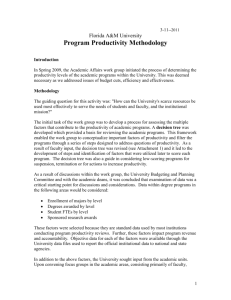
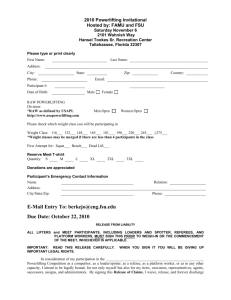
![[A4.4.4] English - Florida Agricultural & Mechanical University](http://s3.studylib.net/store/data/008891352_1-bf5966290d9c41f0af4659ab510775c6-300x300.png)
